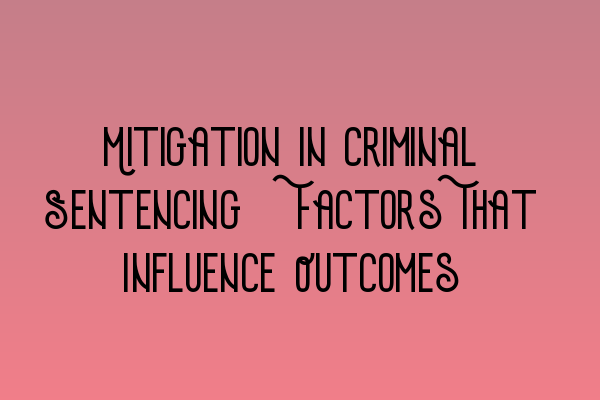Mitigation in Criminal Sentencing: Factors That Influence Outcomes
When it comes to criminal sentencing, there are numerous factors that can influence the outcome. Mitigation is an important consideration in the sentencing process, as it allows for a fair and just punishment that takes into account the individual circumstances of the case. In this article, we will explore the various factors that can impact the mitigation process and ultimately influence the sentencing decision.
The Role of Mitigation
Mitigation is a crucial part of the criminal sentencing process as it allows the court to consider the unique circumstances of the offense and the offender. It aims to provide a fair and proportionate sentence that reflects the culpability and moral blameworthiness of the offender, while also taking into account any factors that may warrant a lesser punishment.
There are several factors that can be considered during the mitigation process. These factors can range from personal circumstances of the offender to the specific nature of the offense committed. Let’s explore some of these influential factors in detail:
1. Personal Circumstances
The personal circumstances of the offender can greatly influence the outcome of the mitigation process. Factors such as age, mental health, education, employment status, and family background can all be taken into consideration. For instance, a first-time offender with no criminal record and a stable family situation may receive more lenient sentencing compared to a repeat offender with a history of violence and instability.
2. Guilty Plea
A guilty plea is another essential factor that can significantly impact the outcome of the mitigation process. Courts encourage defendants to take responsibility for their actions and show remorse by pleading guilty. In return, a guilty plea can lead to a reduction in sentencing as it saves the court’s time and resources. Therefore, it is crucial for defendants to consider the benefits of a guilty plea and its potential impact on the final sentencing decision.
3. Cooperation with the Authorities
Cooperation with law enforcement authorities can also play a role in the mitigation process. Providing substantial assistance in the investigation or prosecution of other individuals involved in criminal activities can be considered as a mitigating factor. This cooperation demonstrates a willingness to rectify the wrongdoing and can lead to a more favorable sentencing outcome.
4. Remorse and Rehabilitation
The expression of genuine remorse by the offender and a demonstrated commitment to rehabilitation can be influential factors in the mitigation process. Showing remorse indicates an understanding of the impact of one’s actions on victims and society as a whole. Additionally, a commitment to rehabilitation through participation in counseling programs, therapy, or educational courses can demonstrate a desire to change and reintegrate into society.
These are just a few examples of the many factors that can influence the mitigation process in criminal sentencing. It is important to note that every case is unique, and the weight given to each factor may vary depending on the specific circumstances. Ultimately, the aim of mitigation is to deliver a fair and just punishment that takes into account the individual factors of the case.
For more information on the SQE (Solicitors Qualifying Examination), including preparation courses, practice exams, and exam dates, you can visit the following links:
- SQE 1 Practice Exam Questions
- SQE 1 Practice Mocks FLK1 FLK2
- SQE 2 Preparation Courses
- SQE 1 Preparation Courses
- SRA SQE Exam Dates
At SQE Criminal Law & Practice Law UK, we understand the importance of thorough preparation for the SQE exams, and our courses are designed to provide you with the knowledge and skills necessary to succeed. Whether you are seeking SQE 1 or SQE 2 preparation, we are here to support you every step of the way.
Thank you for reading this article on mitigation factors in criminal sentencing. We hope you found it informative and useful. If you have any further questions or would like to discuss your SQE exam preparation needs, please do not hesitate to get in touch with us.
